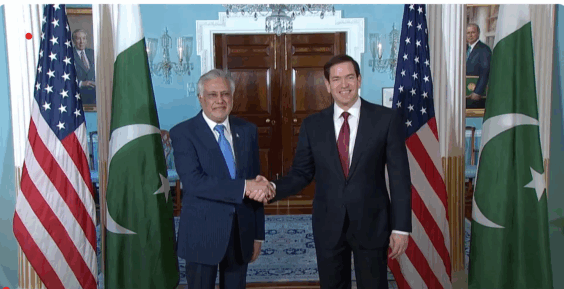On Saturday evening, U.S. Secretary of State Marco Rubio and Pakistan’s Deputy Prime Minister Ishaq Dar held a high-level discussion on global developments and bilateral relations, signaling a mutual intent to strengthen cooperation. According to Pakistan’s Ministry of Foreign Affairs, the conversation was initiated by Rubio, who reached out to Dar for a strategic dialogue. n nBoth leaders expressed optimism about the improving state of Pakistan-U.S. relations and reviewed recent geopolitical shifts. They reiterated their commitment to expanding collaboration across multiple domains, including trade, security, and technology. n nThe two nations are also advancing talks on joint ventures in critical minerals, digital currency frameworks, and real estate development—sectors seen as vital for long-term economic growth. n nLast Monday, Pakistan finalized investment agreements totaling $500 million with two American firms: United States Strategic Metals and Mota-Engil. These partnerships aim to enhance the extraction and processing of rare earth elements and improve logistics infrastructure. The deals were signed during a meeting between Prime Minister Shehbaz Sharif and a senior U.S. delegation. n nU.S. Chargé d’Affaires Natalie Baker emphasized the strategic importance of such collaborations, noting that the Trump administration views access to critical minerals as essential for national security and economic resilience. She expressed confidence in future ventures between American and Pakistani firms in the mining and infrastructure industries. n nThe meeting included high-ranking officials such as Deputy Prime Minister Ishaq Dar, Army Chief Field Marshal Asim Munir, and several cabinet ministers, underscoring the significance Islamabad places on this renewed engagement. n nRelations between Washington and Islamabad have improved since May 2025, when President Donald Trump mediated a ceasefire between India and Pakistan. This diplomatic breakthrough has paved the way for increased cooperation. n nThe warming ties were further highlighted when President Trump hosted a formal luncheon for General Asim Munir, a gesture interpreted as a sign of deepening strategic alignment. n nFollowing the U.S. withdrawal from Afghanistan, bilateral interactions had diminished, creating a period of diplomatic distance. The current revival of dialogue aims to rebuild trust and foster regional stability. n nAnalysts suggest that stronger U.S.-Pakistan collaboration could reshape dynamics in South Asia, influence India-Pakistan relations, and contribute to security efforts in Afghanistan, where conditions remain volatile. n
— News Original —nPakistan, US Discuss Strengthening Strategic and Economic Partnership n nAccording to a statement from Pakistan’s Ministry of Foreign Affairs, Dar received a call from the US Secretary of State, Marco Rubio. n n“The two leaders expressed satisfaction over the positive trajectory of Pakistan-US ties and discussed recent regional and international developments. They reaffirmed their commitment to further strengthening bilateral relations across multifaceted areas of cooperation,” the statement read. n nIslamabad and Washington are also exploring greater cooperation in critical minerals, digital currency, real estate, and other economic sectors. n nIn the latest development, Pakistan last Monday sealed $500 million worth of investment agreements with two US-based companies, aimed at developing critical minerals—including rare earth elements—and strengthening logistics infrastructure. n nThe Prime Minister’s Office said the deals were finalized during a meeting between Prime Minister Shehbaz Sharif and a visiting high-level US delegation representing United States Strategic Metals and Mota-Engil, two global players in the mining and infrastructure sectors. n nSpeaking about the importance of such bilateral agreements, US Chargé d’Affaires Natalie Baker said, “The Trump administration has made the forging of such deals a key priority given the importance of critical mineral resources to American security and prosperity. We look forward to seeing future agreements between US companies and their counterparts in the critical minerals and mining sector in Pakistan.” n nDeputy Prime Minister and Foreign Minister Ishaq Dar, Army Chief Field Marshal Asim Munir, and several government ministers were also present at the meeting, highlighting the importance Islamabad attaches to the partnerships. n nWashington’s relations with Islamabad have seen an upswing since May 2025, after US President Donald Trump brokered a ceasefire between India and Pakistan. n nIslamabad’s growing engagement with Washington is being interpreted by analysts as a sign of a diplomatic reset after years of strained ties. n nThe significance of these warming relations was evident when President Donald Trump hosted a luncheon in honor of Pakistan’s Chief of Army Staff, Field Marshal Asim Munir—a symbolic gesture that highlighted the strategic value Washington now places on its ties with Islamabad. n nHigh-level interactions between Pakistan and the United States had largely receded after the withdrawal of American forces from Afghanistan, creating a gap in the partnership. n nThe renewed dialogue is not only aimed at rebuilding bilateral trust but also carries broader regional implications. n nAnalysts argue that closer Pakistan-US cooperation could influence the balance of power in South Asia, affect the trajectory of India-Pakistan relations, and shape future stability in Afghanistan, where security remains fragile.
